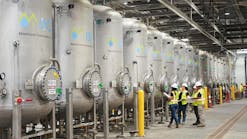SOURCE: ACWA
CALIFORNIA, SEPTEMBER 9, 2016 -- The State Water Resources Control Board on Sept. 8 released a draft report to the Legislature that states it is feasible to develop regulations for the direct potable reuse of recycled water. If such regulations were developed, California would be the first state in the nation to do so.
The report is described as one of the many steps in furthering Gov. Jerry Brown’s goal of a more sustainable water management strategy, as laid out in the California Water Action Plan. The draft report is available now for comment under a 45-day public review period before finalization and presentation to the state Legislature by Dec. 31, 2016.
After reviewing the recommendations of an expert panel and advisory group, the State Water Board’s Division of Drinking Water concluded it is feasible to begin the process of developing regulations. Direct Potable Reuse regulations can be adopted provided that certain research and key knowledge gaps are addressed, the draft report states. The expert panel and advisory group that studied the issue were formed as part of legislation that directed the State Water Board to investigate the feasibility of creating regulations for direct potable reuse.
Direct potable reuse is the addition of recycled water directly into a public water system or into a raw water supply immediately upstream of a water treatment plant. No other state has yet developed regulations specifically for direct potable reuse.
In the draft report, the Division of Drinking Water agrees with the expert panel that regulations for the direct potable reuse of recycled water are attainable. The Division of Drinking Water believes that knowledge gaps and needed research remain to assure adequate public health protection, the division stated in a press release.
“As we face a fifth year of record-breaking drought, and ongoing changes in our environment related to climate change – which could mean more droughts in our future -- expanding our water resource options is a smart thing to do,” State Water Board Chair Felicia Marcus said in a written statement. “We need to take a thoughtful and deliberate approach to diversifying and securing our long term water resilience. Today’s draft, focused on the feasibility of direct potable reuse, is one part of a multifaceted effort that includes a wide range of sources, including indirect potable reuse through groundwater recharge, surface water augmentation, storm water capture, and desalination. The release of today’s draft report is a historic step in bringing online a potential future source of potable water.”
The adoption of regulations related to the direct potable reuse of recycled water will not take place until the knowledge gaps are addressed and additional research is completed related to the protection of public health, officials stated in a press release. However, the development of the criteria for the use of DPR will go forward as the knowledge gaps are addressed and additional research is completed. Due to this ongoing process, a concrete timeframe on when regulations for the direct potable reuse of recycled water will be in place is currently not available, officials stated.
Some of the Division of Drinking Water’s recommendations in moving forward on the development of DPR, include:
- Convening technical workgroups to assist in developing uniform water recycling criteria for direct potable reuse.
- Convening a “blue ribbon” panel to review scientific literature and report on the current state of scientific knowledge regarding the risks of emerging contaminants to public health.
- Developing new methods to evaluate the performance and reliability of DPR treatment.
- Working with the Regional Water Quality Control Boards to include monitoring for pathogens in raw wastewater feeding potable reuse systems.
- Developing more comprehensive analytical methods for unknown contaminants.
- Addressing important implementation issues including: training and certification of operators for potable reuse treatment facilities; optimizing wastewater treatment plant performance to prepare for DPR; enhancing source control programs designed to prevent or minimize discharges of toxic chemicals to sewer systems that feed into DPR treatment plants; and nsuring that agencies implementing DPR projects have adequate technical, managerial, and financial capacity to ensure the success and safety of the project.
With the population of California expected to grow from 38 million to 50 million by 2049, and continued changes in climate that challenge our current water supplies, creating sustainable water resources is a top priority, which is why Governor Brown created the Water Action Plan in 2014. Part of that plan is to increase the use of recycled water.
The State Water Board is committed to safely increasing recycled water usage and has expanded funding and revised regulations to encourage the use of recycled water where appropriate. Non-potable reuse of recycled water for agricultural and landscape irrigation is expanding in the state. Indirect potable reuse of recycled water is already under way in the state with significant groundwater replenishment projects recharging groundwater aquifers used for drinking water. Later this year, the State Water Board also will issue regulations on surface water augmentation with recycled water as another form of indirect potable reuse.
About ACWA
The Association of California Water Agencies (ACWA) is the largest statewide coalition of public water agencies in the country. Its 430 public agency members collectively are responsible for 90% of the water delivered to cities, farms and businesses in California.



